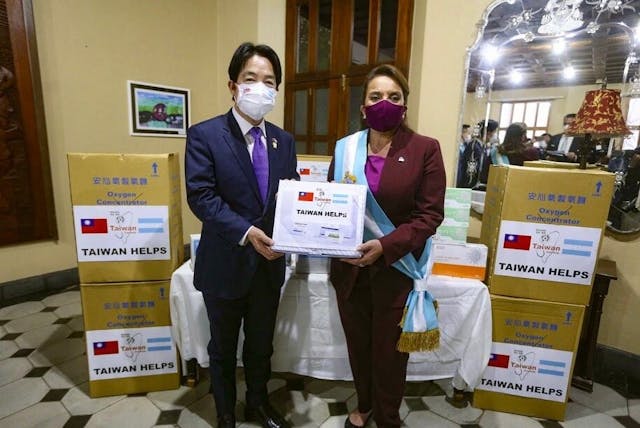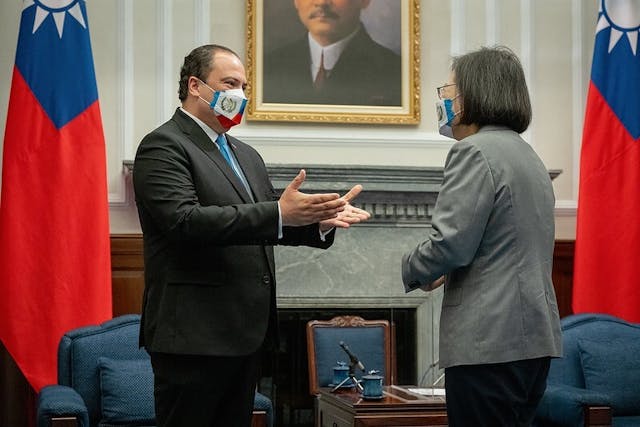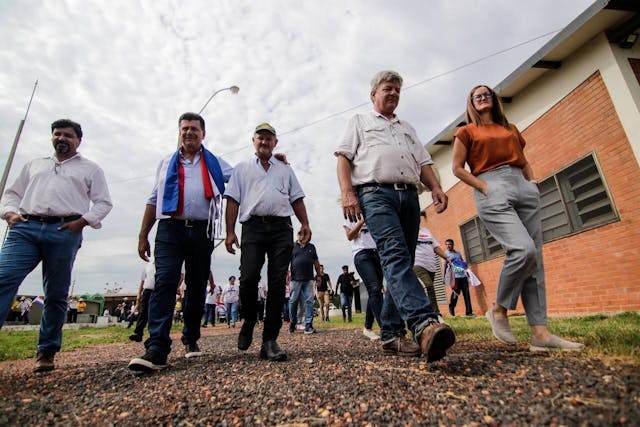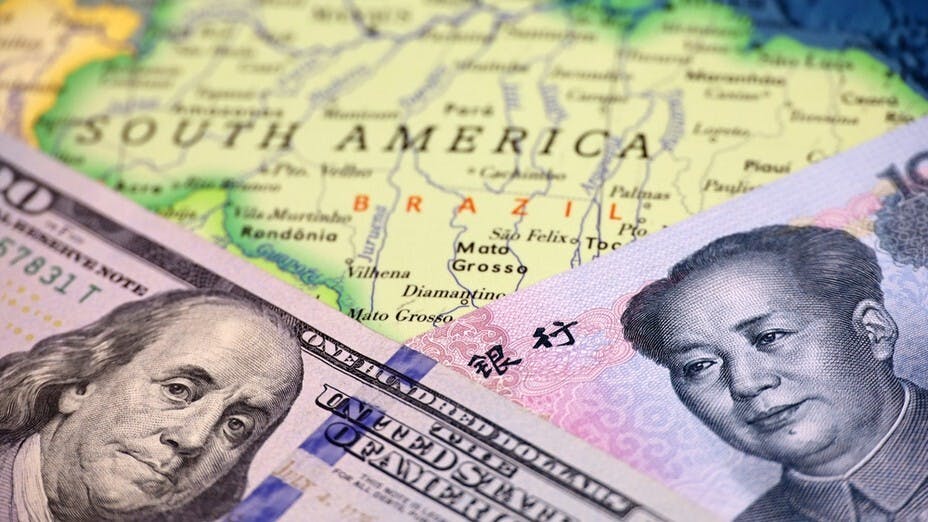近年,拉丁美洲成為中國大陸與台灣之間重要和刺激的外交角力場,這些國家包括目前與台灣有外交關係的洪都拉斯、危地馬拉和巴拉圭。
目前仍與台灣保持外交關係的14個國家中,有3個位於拉丁美洲,即洪都拉斯、危地馬拉和巴拉圭。2022年12月,尼加拉瓜與台灣斷交,與中華人民共和國復交。 除了尼加拉瓜的外交轉變外,巴拿馬、多明尼加和薩爾瓦多也出現了同樣的現象,它們被中國大陸龐大的經濟市場、投資和援助所吸引。
中國市場吸引洪都拉斯轉營
台灣與洪都拉斯的關係,可以追溯到1941年國民政府統治大陸時。然而,台洪外交關係在2021年受到考驗,洪都拉斯前總統塞拉亞之妻希奧瑪拉·卡斯特羅(Xiomara Castro)競選總統並於當年11月28日獲勝。卡斯特羅在競選期間暗示,洪都拉斯可能會改變對台北的外交承認,與北京建交。
選舉結束後,台灣的副總統賴清德立即出席了卡斯特羅的就職典禮,卡斯特羅表示希望洪都拉斯能保持與台灣的外交關係。賴清德在離開洪都拉斯之前表示,台灣將提供更多醫療用品,以幫助洪都拉斯及其未接種足夠疫苗的人群對抗新冠病毒及其變種。
自2006年以來,台灣已經向洪都拉斯提供了2.05億美元的貸款和2700萬美元的捐贈──這是台灣對中美洲國家採取的明顯的美元外交。
儘管如此,據報道,今年1月上旬,卡斯特羅的丈夫塞拉亞表達了他的觀點,即洪都拉斯應從外交承認台灣轉為與中國大陸建交。顯然,巨大的中國市場對洪都拉斯的領導人來說,仍然是有利可圖和具吸引力的。
1月18日,台灣外交部對洪都拉斯外長雷納(Eduardo Enrique Reina)1月1日會見中國外交部副部長謝峰表示「嚴正關切」,當時兩人都出席了巴西新當選總統盧拉的就職典禮。雷納表示,他們會晤的重點是希望中國繼續投資洪都拉斯建設的水電站。
這次會晤引起了台灣官員的擔憂,即北京試圖在短期內贏得洪都拉斯政府的人心,並最終與中華人民共和國建立外交關係。 台灣駐洪都拉斯大使張俊菲向雷納表達了台灣的擔憂,此舉顯示台灣對失去中美洲盟友的恐懼。
台灣外交部強調,台灣已經貢獻了很多可以改善洪都拉斯人民生活的項目。事實上,台灣外交部常務次長俞大㵢曾訪問過台灣的拉美盟友,以鞏固他們的關係,因為有傳言稱其中一些盟友可能會考慮與台灣斷絕外交關係,轉而承認中華人民共和國。
據英文《台北時報》1月15日報道,台灣同意加入美國的倡議,支持洪都拉斯30萬兒童和青年的教育。美國國際開發總署(USAID)將在未來3年內提供2800萬美元用於洪都拉斯的重建校舍計劃,翻新至少51所學校,台灣將響應美方倡議捐贈200萬美元。
從洪都拉斯的角度來看,雖然與美國保持良好關係很重要,美國顯然是在遊說洪都拉斯當局與台灣保持外交關係,但經濟實用主義無疑促使洪都拉斯領導人萌生轉變外交承認的想法。作為卡斯特羅的外交政策顧問,魯道夫·帕斯特(Rodolfo Pastor)早在2021年12月就表示:「(台灣)與我們有良好關係,我們對此負有責任;但我確實相信,我們也有責任務實地對自己的人民負責,並了解中國大陸今天扮演着我們不能忽視的重要角色。」兩難的困境一直困擾着洪都拉斯當局。
洪都拉斯向台灣出口蝦、牛肉和咖啡豆。然而,龐大的中國市場仍然對洪都拉斯政府和農民極具吸引力和有利可圖。

危地馬拉珍視美台關係
另一方面,危地馬拉自1933年與中華民國建交後,至今仍是台灣的重要盟友。2022年9月,外交部長馬里奧·布卡羅(Mario Bucaro)訪台,並表示危地馬拉仍是台灣的「真正盟友」。他補充說,危地馬拉總統亞歷杭德羅·賈馬泰(Alejandro Giammattei)在支持台灣方面有「堅定的信念」,包括台灣的「主權」和「台灣人民和平生活的權利」。
台灣在公共衛生、教育、農業現代化等方面為危地馬拉提供大量資金支持,包括2021年6月興建新醫院。危地馬拉也視台灣為出口產品進入東南亞市場的踏腳石,尤其是在民進黨領導下的台灣,強調其經濟在亞洲擴展的「南向政策」的時候。台灣也利用了危地馬拉在中美洲的戰略位置,尤其是後者與美國和墨西哥達成了自由貿易協議。
2022年12月,台灣的蔡英文總統會見了危地馬拉新任駐台北大使巴迪亞(Oscar Adolfo Padilla Lam)。蔡英文表示,台灣和危地馬拉在自由、主權和民主方面擁有共同的價值觀,並誓言將雙邊關係推向新高度。
與洪都拉斯一樣,危地馬拉同樣珍視與美國和台灣的歷史及外交關係。洪都拉斯和危地馬拉的親美親台傾向,是台灣在中美洲外交政治的標誌。

反對派重視中國市場 巴拉圭立場成疑
然而,據今年1月初的報道,如果巴拉圭反對派在4月30日的總統選舉中獲勝,可能會與台灣斷交,轉而承認中華人民共和國。反對派候選人阿雷格雷(Efraín Alegre)公開表示,與中華人民共和國建交將「為巴拉圭的農畜產品開拓更大的市場」。阿雷格雷是「真正激進自由黨」(Authentic Radical Liberal Party)候選人,該黨尋求與執政的保守派「國家共和聯盟」(Colorado Party)競爭,並擊敗這個與台灣保持外交關係的執政黨。
鑑於許多與中國大陸建交的拉美國家,從巴西到阿根廷,從玻利維亞到智利,從厄瓜多爾到秘魯,從委內瑞拉到墨西哥,從巴拿馬到多明尼加,中國大陸投資持續湧入 ,阿雷格雷和他的競選顧問明白,如果他們在總統選舉中採取更親華的外交政綱,可以獲得更多選票的優勢。
今年1月9日,台灣的蔡英文總統會見巴拉圭眾議院議長洛佩茲(Carlos María López)率領的巴拉圭跨黨派國會議員代表團。 蔡英文強調雙方的「深厚友誼」,並強調加強「民主陣線」的重要性──這句話說明了意識形態紐帶的重要性。洛佩茲和阿雷格雷一樣,是「真正激進自由黨」的成員。
2022年9月,據報道,巴拉圭當局要求台灣增加投資,以確保他們抵制「誘惑和壓力」,轉向外交承認中華人民共和國。總統馬里奧·阿布多·貝尼特斯(Mario Abdo Benitez)表示,希望有更多的台灣投資來鞏固巴台的「戰略夥伴關係」。
從表面上看,巴拉圭當局抓住了北京與台北競爭的機會,從台灣方面榨取更多投資,儘管巴拉圭外交部澄清說,與台灣的關係更多是基於「民主價值及原則」,而非有交換條件或經濟利益。儘管如此,當執政黨希望獲得更多台灣投資時,反對黨希望通過考慮通過外交轉向承認中華人民共和國來獲得更多選民的選票,這並不奇怪。

中美台外交角力加劇
總之,北京和台北之間的外交角力在中美洲和拉丁美洲比以往任何時候都更加突出,特別是在中國共產黨第20次全國代表大會之後,北京將兩岸關係置於政策議程首位。儘管洪都拉斯和危地馬拉仍然親美親台,但它們的執政精英仍被中國大陸誘人且利潤豐厚的市場所吸引。洪都拉斯和巴拉圭的選舉政治開啟了將外交承認從台灣轉向中國大陸的可能性。美國明顯與台灣聯手,似乎是在幕後運作加強美元外交,以確保台灣與洪都拉斯的外交關係。在中國大陸、台灣與美國在中美洲和拉丁美洲的美元外交政治角力中,巴拉圭的總統選舉結果會否改變與台灣的外交關係?仍有待觀察。
Diplomatic wrestling between Taipei and Beijing over Honduras, Guatemala and Paraguay
Latin America has become an important and exciting arena of diplomatic wrestling between Taiwan and mainland China in the recent years, including Honduras, Guatemala and Paraguay that so far have diplomatically recognized Taiwan.
Of the 14 states which are still maintaining diplomatic recognition of Taiwan, three are located in Latin America, namely Honduras, Guatemala and Paraguay. In December 2022, Nicaragua severed its diplomatic relations with Taiwan and reestablished relations with the People’s Republic of China (PRC). Apart from Nicaragua’s diplomatic change, the same phenomenon could be seen in the cases of Panama, Dominican Republic and El Salvador which were lured by the vast mainland Chinese economic market, investment and aid.
Taiwan’s relations with Honduras could be traced back to 1941 when the Chiang Kai-shek government ruled the mainland. However, their diplomatic relations were tested in 2021 as Xiomara Castro, the wife of the former Honduran leader Jose Zelaya, ran for the presidential election and won on November 28. Castro hinted during her election campaign that Honduras would perhaps change its diplomatic recognition from Taiwan to mainland China.
Immediately after the election, Taiwan’s vice president William Lai Ching-te attended Castro’s inauguration ceremony during which Castro pointed to the continuation of their diplomatic relations. Before Lai’s departure from Honduras, he said that Taiwan would provide more medical supplies to help Honduras combat Covid-19 and its variants among its half-vaccinated population.
Since 2006, Taiwan has already provided US$205 million loans and donated US$27 million to Honduras – an obvious dollar diplomacy adopted by Taipei toward the Central American state.
Still, in early January 2023, it was reported that Castro’s husband Zelaya expressed his view that Honduras should change its diplomatic recognition from Taiwan to mainland China. Obviously, the huge mainland Chinese market remains lucrative and attractive to the Honduran leaders.
On January 18, the Taiwan ministry of foreign affairs expressed its “grave concern” after the Honduran Foreign Minister Enrique Reina met the Vice Minister of Chinese Foreign Ministry Xie Feng on January 1, when both attended an inauguration ceremony of the newly elected Brazilian President Lula da Silva. Reina remarked that their talks focused on China’s potential investment in the construction of a hydroelectric dam in Honduras.
The meeting raised the concerns of Taiwan officials that Beijing tried to win the hearts and minds of the Honduran government in the short run and to establish diplomatic relations with the PRC eventually. The Taiwan ambassador to Honduras, Viva Chang, expressed Taiwan’s concern to Reina – a move showing the fears of Taiwan in losing its ally in Central America.
The Taiwan foreign ministry stressed that Taiwan had already contributed to a lot of projects that could improve the livelihood of the Hondurans. In fact, the Taiwan vice foreign minister Alexander Yui had visited Taiwan’s Latin American allies to consolidate their relationships amid rumors that some of them might consider cutting their diplomatic ties with Taiwan and switching diplomatic recognition to the PRC.
According to Taipei Times on January 15, Taiwan agreed to join a US-initiative to support the education of 300,000 children and youth in Honduras. The US Agency for International Development (USAID) is going to provide US$28 million for educational improvement of Honduras in the next three years, refurbishing at least 51 schools and collaborating with Taiwan which would contribute US$2 million to the initiatives.
From the Honduran perspective, while it is important to maintain good relations with the US, which obviously lobbies the Honduran authorities to retain diplomatic relations with Taiwan, economic pragmatism does propel the Honduran leadership to toy with the idea of switching diplomatic recognition. As a foreign policy adviser to Castro, Rodolfo Pastor, remarked as early as December 2021: “We have a responsibility to [Taiwan] as someone with whom we have had a good relationship. But I do believe that we also have a responsibility to our own population to be realistic, to be pragmatic and to understand that mainland China today plays a determining role that we cannot let go unnoticed.” This dilemma persists in the psyche of Honduran authorities.
Honduras exports shrimps, beef and coffee beans to Taiwan. However, the huge PRC market remains highly attractive and lucrative to not only the farmers but also the government authorities in Honduras.
On the other hand, Guatemala remains a crucial ally of Taiwan after both sides established diplomatic relations back in 1933. In September 2022, Foreign Minister Mario Bucaro visited Taiwan and remarked that Guatemala remains Taiwan’s “true ally.” He added that the Guatemalan President Alejandro Giammattei was “vocal” in defending Taiwan’s interests, including the island’s “sovereignty” and “the right of the Taiwan people to live in peace.”
Taiwan has been offering a lot of financial support for Guatemala in the areas of public health, education, agricultural modernization, including the construction of a new hospital in June 2021. Guatemala also sees Taiwan as a stepping-stone for its exports to enter the market in Southeast Asia, especially at a time when Taiwan under the Democratic Progressive Party leadership has emphasized its southward policy of economic expansion in Asia. Taiwan has also taken advantage of Guatemala’s strategic location in Central America, especially as the latter has free agreement with the US and Mexico.
In December 2022, Taiwan leader Tsai Ing-wen met Guatemala’s new ambassador to Taipei, namely Oscar Adolfo Padilla Lam, who said that both states had shared values in freedom, sovereignty and democracy, and who vowed to bring new heights in their bilateral relations.
As with Honduras, Guatemala cherishes its historical and diplomatic relations with not only the US but also Taiwan. The pro-US and pro-Taiwan tendencies of Honduras and Guatemala are the hallmarks of Taiwan’s diplomatic politics in Central America.
However, in early January 2023, it was reported that Paraguay would perhaps cut its diplomatic ties with Taiwan and switch its recognition to the PRC if the opposition wins the presidential election on April 30. Opposition candidate Efrain Alegre openly said that diplomatic relations with the PRC would boost Paraguay’s exports of soy and beef. Alegre is a candidate of the broad coalition, namely Authentic Radical Liberal Party, that seeks to compete with and defeat the ruling conservative Colorado Party, which maintains diplomatic relations with Taiwan.
Seeing that many Latin American states which establish diplomatic relations with the PRC have witnessed a continuous influx of mainland Chinese investment, ranging from Brazil to Argentina, from Bolivia to Chile, from Ecuador to Peru, from Venezuela to Mexico, and from Panama to Dominican Republic, Alegre and his election campaign advisers understand the advantage of securing more votes if they adopt a more pro-China foreign policy platform in the presidential election.
On January 9, 2023, Taiwan leader Tsai Ing-wen met a cross-party delegation of legislators from Paraguay which was led by Paraguayan Chamber of Deputies President Carlos Maria Lopez. Tsai emphasized the “deep friendship” of both sides and she stressed the importance of strengthening “the democratic front” – a remark illustrating the significance of an ideological bond. Lopez, as with Alegre, is a member of the Authentic Radical Liberal Party.
In September 2022, it was reported that Paraguay authorities asked Taiwan for more investment to ensure that they would resist the temptation and pressure to switch diplomatic recognition to the PRC. President Mario Abdo Benitez said he hoped for more Taiwan investment to build up their “strategic alliance.”
On the surface, the Paraguayan authorities grasped the opportunities of Beijing-Taipei rivalries to extract more investment from the Taiwan side, although the Paraguay foreign ministry clarified that the relations with Taiwan were based more on “common values and ideas” than on a reciprocal exchange. Still, it is not surprising that while the ruling party desires to have more Taiwanese investment, the opposition wants to get more votes from the voters by considering a diplomatic change to recognize the PRC.
In conclusion, the diplomatic wrestling game between Beijing and Taipei has become far more prominent in Central and Latin America than ever before, especially after the 20th Communist Party of China Congress during which the PRC is going to put its relations with Taiwan on the top of its policy agenda. While Honduras and Guatemala remain pro-US and pro-Taiwan, their governing elites are still lured by the attractive and lucrative market in mainland China. Electoral politics in Honduras and Paraguay are opening up the possibility of switching diplomatic recognition from Taiwan to mainland China. Working behind-the-scene appears to be the US, which has apparently teamed up with Taiwan to enhance their dollar diplomacy to secure Taiwan’s diplomatic relations with Honduras. It remains to be seen whether the presidential election result in Paraguay would alter the diplomatic relations with Taiwan amid the politics of dollar diplomacy between mainland China, Taiwan and the US in Central and Latin America.
原刊於澳門新聞通訊社(MNA)網站,本社獲作者授權轉載。網址:
https://www.macaubusiness.com/opinion-diplomatic-wrestling-between-taipei-and-beijing-over-honduras-guatemala-and-paraguay/


































